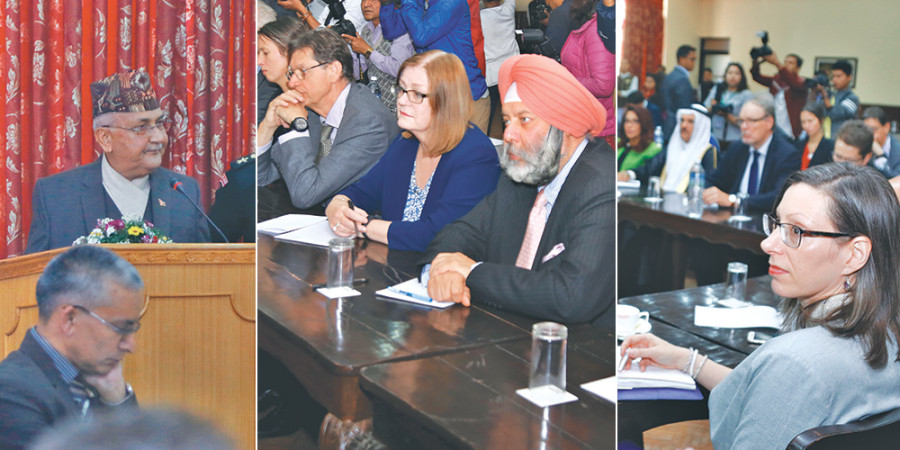Miscellaneous
PM briefs international community
Prime Minister KP Sharma Oli apprised the diplomatic and donor communities in Kathmandu at length on Tuesday on the priorities of his government and its foreign policy, nearly two months after taking office.
Prime Minister KP Sharma Oli apprised the diplomatic and donor communities in Kathmandu at length on Tuesday on the priorities of his government and its foreign policy, nearly two months after taking office.
Top Kathmandu-based diplomats including from India, China, the United States, the United Kingdom, the European Union and the UN System, totalling 29 in number, attended the meeting, alongside representatives from the World Bank, International Monetary Fund and the Asian Development Bank.
At the outset, PM Oli presented a brief summary of how the new constitution was promulgated in 2015 and the subsequent two years until formation of the federal and provincial governments following three tiers of election. The briefing comes weeks before the prime minister’s planned visit to New Delhi.
It may also be seen in light of the recent controversy over election observation report by an EU Mission. The government earlier protested some of its recommendations for electoral reform, particularly the suggestion of denying Khas-Aryas their proportional representation election quota.
Without hitting the report, Oli warned on Tuesday against attempts “from different quarters to disrupt our social harmony and cohesion under various pretexts”.
“There might be some elements who believe in perpetuity of conflict and discord in our society. We do not want to see our people exploited under any ulterior agenda,” the PM said. He reassured the international community that there should be no blanket amnesty for serious violations of human rights and humanitarian laws.
On foreign relations, Oli said Nepal respects genuine concerns of its neighbours while promoting cordial relations with both India and China. He explained in detail Nepal’s foreign policy priorities in the neighbourhood, with major powers and development partners, with labour receiving countries, Nepal’s multilateral engagements, peaceful resolution of disputes, disarmament, fight against terrorism and regional forums.
He said Nepal would remain engaged in the ‘vibrant economic drive’ of the neighbourhood with a view to benefiting from it.
According to Oli, his government’s policies and programmes rested on six fundamental pillars. He stressed “nationalism”as a major pillar of his government, citing its importance for protection of Nepal’s sovereignty, territorial integrity, national independence, and fulfilment of “our national interest”.
“We, the Nepalis, are a proud people with our long and glorious history of independence and sovereignty. We are committed to safeguarding that space for the benefit of our national interest and for the good of our posterity. Pursuit of national interest and fulfilment of international obligations must go hand in hand. This comes as a non-negotiable priority for us.”
Second, Nepal’s commitment to democracy and fundamental freedom is “total and unflinching.” The third priority was social justice, which the PM explained as equitable opportunity and equal protection for all sections of society. “Unity in diversity has been a primary source of our strength.”
On development priority, Oli said: “We urge development partners to align assistance with our priorities, respecting our leadership and ownership in the process and channelising such support through government mechanisms.” The absence of CPN (Maoist Centre) ministers from the function was conspicuous.




 9.7°C Kathmandu
9.7°C Kathmandu









